Far from acting defensively to preserve the social relations and red ideologies that originally gave it power, the Chinese Communist Party is leading a social and economic transformation that could be expected to lead to direct challenges to its authority. The surprising degree of change in the Chinese socio-economic transformation and the fact that this transformation has been going on for forty years now and has not yet resulted in fundamental challenges subverting its rule have inspired my study. The overarching theoretical enquiry in my book resonates with one of the most important theoretical questions in political sociology: how does the state maintain compliance from the governed in periods of rapid social and economic transformation, and how does the logic of its governmentality change along with its priorities? My work is built on the Weberian and Gramscian tradition of understanding state rule and highlights the individual’s rationale of “believing” and “consent”, but also takes account of the Foucaudian “governmentality” the state uses to maintain its rule and investigates the underlined rationality. Empirically, I take advantage of the pension changes among China’s social welfare reforms, decipher a two-way story of statecraft in authoritarian regimes and explore whether there may be room for cognitional counter-conduct from the public. My work demonstrates that the Chinese state works through benefit allocation, propaganda, experimentation with policy and many other approaches, in order to shape public expectations and justify its rule. However, the state’s well-designed statecraft needs to enable individuals to make sense of their experience and must resonate with their “common sense”. Individuals can update their knowledge from personal interest, information from government policies, signals from current society (their peers) to decide whether to stay loyal or choose non-compliance. In a situation when active counter-conduct such as resistance is not possible, individuals may choose cognitional rebellion and falsify their public compliance.
YAN WANG is Research Fellow in the School of Public Policy at the London School of Economics (LSE), previously LSE Fellow at the Department of Methodology, LSE. Dr. WANG received a BS in Sociology and a MA in Management, from the Tsinghua University, and a PhD in Sociology from LSE. Her research seeks to understand the issues of state legitimacy, public opinion, and the redistribution of public goods. She is especially interested in how actors’ agency shapes authoritarian governmentality and the realisation of public’s social rights, and how and why public opinion changes during the state-society interactions. She is also interested in welfare equalisation in a comparative perspective, and state governance in general. Dr. WANG has won several research grants, including Research Infrastructure and Investment Fund (RIIF) from the Department of Methodology, LSE, and British Academy Small Grant as Co-PI. Her book ‘Pension Policy And Governmentality In China: Manufacturing public compliance ’ is forthcoming in early 2022. Her recent publications include articles in Journal of Chinese Political Science and so on.
Remarks
- ZOOM link will be sent via email, for HKUST members ONLY
- Please use your HKUST ITSC account to join the zoom meeting.
- This meeting is being recorded. By joining, you are giving consent for this meeting to be recorded.

